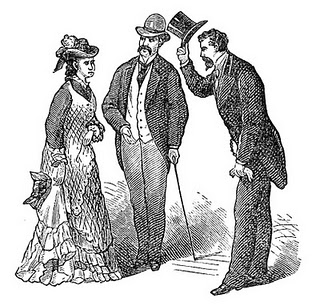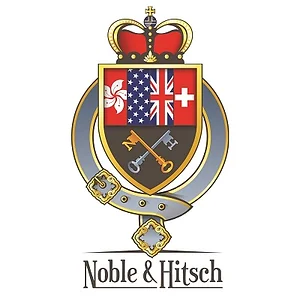Its Origins and Relevance Today
For many years, we’ve been told by historians, tutors, and experts that etiquette was “invented” by Louis XIV of France, better known as The Sun King. Legend has it that Louis, while reigning at the Grand Palace of Versailles, put up small signs or tickets around the palace grounds instructing guests and staff on how to behave. The most famous of these tickets, according to popular belief, carried a simple message: “Keep Off the Grass.” The French word “étiquette,” after all, translates to “ticket” or “label,” and it is from this term that we get the modern word “etiquette.” While we can credit the French for coining the term, the notion that Louis XIV invented the concept of proper behavior is a bit of a stretch.
If we truly examine the history of etiquette, we’ll find that the practice of good manners predates Louis XIV by millennia. Let’s explore the roots of etiquette by looking at different cultures and historical records, proving that the art of refined behavior and interpersonal conduct existed long before the opulent courts of 17th-century France.
The Ancient Roots of Etiquette
To find the earliest examples of etiquette, we must go far beyond France and travel back nearly 5,000 years to ancient Egypt. One of the oldest known works on proper behavior is The Maxims of Ptahhotep, an Egyptian text dating from around 2500 BCE. This book, written by an Egyptian vizier named Ptahhotep, contains a wealth of instructions on how to behave in human relationships. The maxims are designed to encourage wisdom, respect, and harmonious living.
Among Ptahhotep’s teachings, you’ll find advice such as “Listening benefits the listener,” a message that remains relevant today. He also warns of the perils of arrogance and ignorance, saying, “The ignorant man who does not listen accomplishes nothing,” emphasizing the importance of humility and attentiveness in relationships. It’s striking to find that thousands of years before Louis XIV, the Egyptians were already developing rules of etiquette and emphasizing the value of proper conduct in society.
Confucian Etiquette in Ancient China
Roughly 2,000 years after the time of Ptahhotep, another giant of human thought, Confucius, was making his mark on the world—this time in ancient China. Confucius, who lived from 551 to 479 BCE, emphasized the importance of social harmony and moral integrity. His philosophy, which shaped Chinese culture for centuries, placed a strong emphasis on the rules of proper behavior in interpersonal relationships.
One of Confucius’ most significant contributions to etiquette can be found in his work The Doctrine of the Mean and The Book of Rites. These texts contain collections of his teachings, defining proper behavior in various social settings. Confucius stressed that observing good manners was a way of maintaining order and respect within society. In his view, Etiquette was not simply about outward appearances but about promoting justice, sincerity, and morality. His teachings on relationships, family respect, and social roles form the foundation of Chinese etiquette and continue to influence societal norms today.
Etiquette Across Cultures
The idea of proper behavior is not unique to Egypt or China. Across the world, every culture has developed its own version of etiquette—rules that govern how individuals should interact with one another in different social contexts. For example, the Greeks and Romans placed a high value on hospitality, with clear guidelines for how to treat guests. The concept of “xenia” in ancient Greece referred to the sacred bond between hosts and guests, dictating that travelers be treated with honor and respect, regardless of status.
Similarly, medieval Europe had its forms of etiquette, particularly within the knightly and aristocratic classes. The concept of chivalry, which arose during this time, defined how knights should behave in matters of love, war, and courtly life. Courtesy, generosity, and loyalty were key tenets of chivalric etiquette, which heavily influenced how the European upper classes conducted themselves.
As we can see, long before Louis XIV came onto the scene, cultures around the world were developing sophisticated codes of conduct to ensure harmonious relationships within society. This helps debunk the myth that etiquette was “invented” by one man in France.
The Sun King’s Contribution
While Louis XIV didn’t invent etiquette, he certainly popularized it, particularly within the aristocratic world of his time. The Court of Versailles was known for its opulence. Louis insisted that his courtiers adhere to a strict set of behavioral codes governing everything from how one should bow to what attire was appropriate for different occasions. These rules weren’t just arbitrary; they were designed to display loyalty and respect for the king, reinforcing the rigid social hierarchy that defined Louis’s reign.
Under Louis, etiquette became more than just a matter of manners—it was a tool for social control. Those who followed the king’s elaborate rules could gain his favor, while those who failed to adhere risked being ostracized from the court. In this way, etiquette became a mark of prestige, separating the noble classes from the common people.
The Purpose of Etiquette Today
While critics might argue that etiquette is outdated, its core purpose remains just as relevant today as it was in the past. Etiquette is not simply about learning which fork to use or how to address a duke. At its heart, etiquette is about making others feel comfortable and respected in your presence. In this sense, etiquette is a tool for creating harmonious social interactions, ensuring that everyone feels valued, regardless of their background or status.
Etiquette can be as simple as holding the door for someone, listening actively during a conversation, or showing up on time for a meeting. These small gestures of respect help foster positive relationships in our personal lives and the workplace. Etiquette isn’t a tool of elitism or snobbery; it’s a means of building empathy and understanding between individuals.
The Pitfalls of Ignoring Etiquette
Ignoring basic etiquette can lead to misunderstandings, hurt feelings, and damaged relationships. A lack of etiquette in professional settings can undermine your credibility and harm your career. For example, failing to acknowledge a colleague’s contribution in a meeting can make them feel undervalued, and interrupting someone when they’re speaking can convey a lack of respect.
Moreover, in today’s globalized world, understanding etiquette is more important than ever. As we interact with people from different cultures, being aware of their social customs and norms helps to build bridges and avoid misunderstandings. Something as simple as a handshake, bow, or greeting can carry different meanings in different cultures, and knowing how to navigate these situations is a valuable skill.
A Universal Language of Respect
In the realm of social interactions, etiquette serves as a unifying force, transcending the boundaries of class or occupation. Consider, for instance, the diverse scenarios that unfold when individuals from various walks of life come together.
When a distinguished figure, such as the King of England, meets with a member of the aristocracy, such as the Duke of Westminster, the setting may call for a refined tea service. Conversely, when two hardworking construction workers from London find themselves in each other’s company, a pint of ale may be the preferred beverage.
Etiquette, however, does not pass judgment on these differences. Rather, it embraces the unique customs and preferences of each occasion, treating both the tea and the pint as equally appropriate. Even the language used, be it the measured tones of royalty or the more colloquial expressions of the working class, is viewed through the lens of etiquette with equal respect.
This inclusive approach to etiquette is particularly valuable for American-based Private Service Professionals (PSPs), who often find themselves navigating diverse social landscapes. By understanding and embodying the principles of etiquette, they can foster an atmosphere of mutual understanding and respect, regardless of the background or status of those they serve.
Through this refined and adaptable perspective, etiquette emerges as a universal language, bridging the gaps between individuals and creating a harmonious social fabric. For the American PSP, mastering this art can be a powerful tool in building lasting connections and providing exceptional service.
Modern Etiquette: A Tool for Inclusivity
One of the most important functions of etiquette today is its ability to promote inclusivity. Far from being a tool of elitism, modern etiquette can help ensure that everyone feels welcome and valued in social and professional settings. This includes being mindful of gender-neutral language, showing respect for diverse cultural practices, and being aware of the impact of one’s words and actions on others.
In this way, etiquette serves as a tool for fostering greater understanding and respect in a diverse, interconnected world. It reminds us that, regardless of our differences, we share a common goal of treating each other with kindness and consideration.
Final Thoughts
So, is etiquette really French? While we can credit the French for giving us the word “etiquette” and for popularizing certain social customs, the practice of good manners and proper behavior has existed across cultures for thousands of years. From ancient Egypt to Confucian China to medieval Europe, etiquette has always been about creating harmony in human relationships. Today, etiquette remains an essential tool for fostering respect, inclusivity, and positive interactions in our increasingly complex and diverse world. Whether at a royal banquet or a casual gathering, etiquette helps ensure that everyone feels comfortable, respected, and valued.
Founder, Noble & Hitsch
© 2024 Private Service Alliance, all rights reserved
The content provided in this blog is for general informational and educational purposes. While efforts are made to ensure accuracy, the information may not apply to all individual circumstances or address specific situations. Readers should not rely solely on the content here but should seek professional guidance tailored to their specific needs, particularly in legal, financial, or employment matters. The blog and its authors are not responsible for any actions based on this information. Links to external sites are for reference purposes, and PSA is not responsible for the content or accuracy of external sources.





